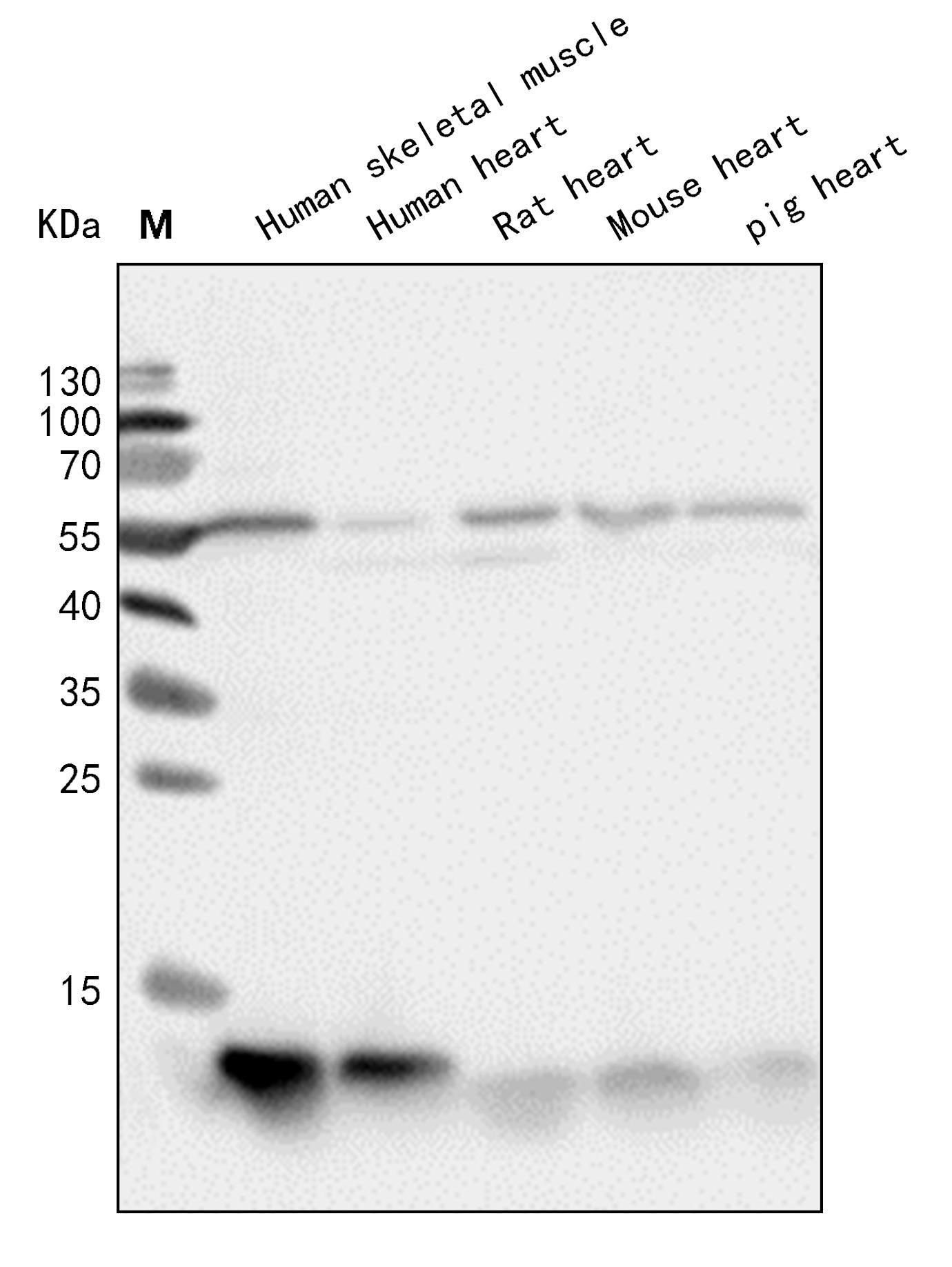
Anti-FABP3 Antibody, Rabbit Polyclonal
产品编号:PA00313HuA10
$ 询价
规格 50uL 100uL 200uL
产品名称:Anti-FABP3 Antibody, Rabbit Polyclonal
经验证的应用:WB/ICC
交叉反应:/
特异性:human FABP3
免疫原:Recombinant human FABP3 protein, fragment Val2~Ala133; UniprotKB: P05413
制备方法:Produced in rabbits immunized with human FABP3, and purified by antigen affinity chromatography.
来源:Polyclonal Rabbit IgG
纯化:Immunogen affinity purified
缓冲液:Supplied in PBS, 50% glycerol and less than 0.02% sodium azide, PH7.4
偶联物:Unconjugated
状态:Liquid
运输方式:This antibody is shipped as liquid solution at ambient temperature. Upon receipt, store it immediately at the temperature recommended.
储存条件:This antibody can be stored at 2℃-8℃ for one month without detectable loss of activity. Antibody products are stable for twelve months from date of receipt when stored at -20℃ to -80℃. Preservative-Free. Avoid repeated freeze-thaw cycles.
图片:
Figure1.Western blot analysis of extracts of various cell lines using FABP3 antibody (PA00313HuA10) at 1:1000 dilution. Lysates/proteins: 25ug per lane.Blocking buffer: 10% nonfat dry milk in TBST. Detection: ECL Basic Kit . Exposure time: 8s.
Figure2.Immunohistochemistry (Formalin/PFA-fixed paraffin-embedded sections) analysis of human heart sections labelling FABP3 with purified PA00313HuA10 at 10ug/ml. Heat mediated antigen retrieval was performed using citrate buffer (pH 6.0). Tissue was counterstained with Hematoxylin. Rabbit specific IHC polymer detection kit HRP/DAB secondary antibody was used at 1/4000 dilution. PBS instead of the primary antibody was used as the negative control.
Figure3.Immunohistochemistry (Formalin/PFA-fixed paraffin-embedded sections) analysis of human skeletal muscle sections labelling FABP3 with purified PA00313HuA10 at 10ug/ml. Heat mediated antigen retrieval was performed using citrate buffer (pH 6.0). Tissue was counterstained with Hematoxylin. Rabbit specific IHC polymer detection kit HRP/DAB secondary antibody was used at 1/4000 dilution. PBS instead of the primary antibody was used as the negative control.
背景信息:FABP3/H-FABP. Fattyacid binding protein-3 (FABP3; also named Fatty acid binding protein 11,FABP11, H- or M- (heart or muscle) FABP, Mammary derived growth inhibitor, orMDGI) is a member of a large superfamily of lipid binding proteins that areexpressed in a tissue specific manner (1, 9, 10). FABP3 is one of tencytoplasmic FABPs that are 14-15 kDa in size and range from 126-140 aminoacids (aa) in length (1, 2, 3). Although all are highly conserved in theirtertiary structure, there is only modest aa identity between any two members.The FABP family members are subdivided based on organ or tissue type it wasoriginally expressed or identified; liver- (L-FABP), intestine- (I-FABP), heart-(H-FABP), adipocyte- (A-FABP), epidermal- (E-FABP), ileal- (IL-FABP), brain-(B-FABP), myelin- (M-FABP) and testis-FABP (T-FABP) (1). Human H-FABP, the productof the FABP3 gene, is a 132 aa cytosolic protein that shows a flattened beta-barrel structure generated by a series of antiparallel beta ‑strands and twoalpha ‑helices(4, 5, 7). One molecule of FABP3 is capable of binding onelong-chain fatty acid (6, 8, 11).It is suggested that ligands first bind to the outside of the molecule, andthis binding subsequently induces a conformational change in the bindingprotein, resulting in "internalization" of the ligand (7, 11). HumanFABP3 is 86%, 89% and 89% aa identical to mouse, rat and canine FABP3,respectively. It also shows 29% and 32% aa identity to human L-FABP and I‑FABP, respectively.
全称:Fatty acid-binding protein, heart (FABP3)
说明书:
 |
说明书 |

